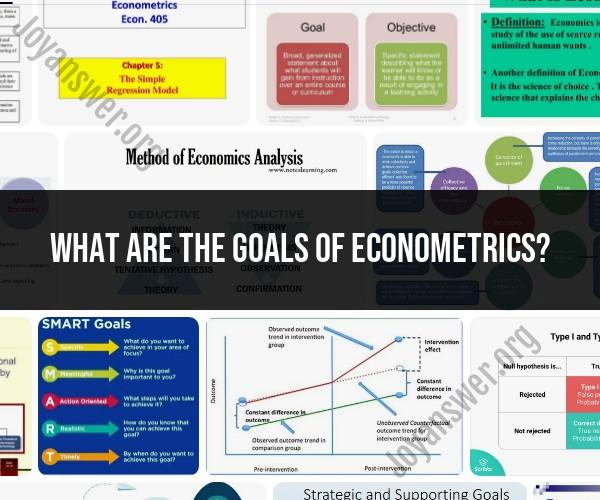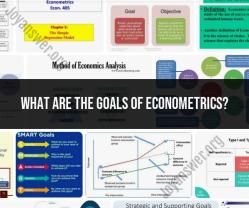What are the goals of Econometrics?
Econometrics is a branch of economics that utilizes statistical methods and mathematical models to analyze and test economic theories and hypotheses. The primary goals of econometrics are to provide empirical content to economic relationships, estimate and test economic theories, and make predictions or forecasts. The analytical aims of econometrics can be summarized as follows:
Modeling Economic Relationships:
- Objective: To formulate mathematical models that represent economic relationships and capture the underlying structure of economic phenomena.
- Importance: Econometric models allow economists to express theoretical concepts in a quantitative form, facilitating empirical analysis.
Estimating Parameters:
- Objective: To estimate the numerical values of parameters in econometric models.
- Importance: Parameter estimation provides insights into the strength and nature of relationships between economic variables, helping economists understand the quantitative aspects of economic phenomena.
Hypothesis Testing:
- Objective: To test hypotheses about economic theories using statistical methods.
- Importance: Hypothesis testing allows economists to assess the validity of economic theories and make inferences about the population based on sample data.
Causal Inference:
- Objective: To establish causal relationships between economic variables.
- Importance: Econometrics aims to identify cause-and-effect relationships, helping economists understand how changes in one variable impact another.
Forecasting and Prediction:
- Objective: To use econometric models to make predictions and forecasts about future economic outcomes.
- Importance: Forecasting assists policymakers, businesses, and individuals in making informed decisions based on expected economic conditions.
Policy Evaluation:
- Objective: To evaluate the impact of economic policies or interventions.
- Importance: Econometrics helps assess the effectiveness of policies by analyzing data and measuring the outcomes associated with specific policy changes.
Understanding Economic Behavior:
- Objective: To gain a deeper understanding of the behavior of economic agents, such as consumers, firms, and governments.
- Importance: Econometrics allows economists to quantify and analyze the decision-making processes of economic actors, contributing to a better understanding of economic behavior.
Dealing with Uncertainty:
- Objective: To quantify and account for uncertainty in economic analysis.
- Importance: Econometric models provide measures of uncertainty around parameter estimates, helping economists acknowledge and incorporate the inherent variability in economic data.
Model Validation:
- Objective: To assess the validity and reliability of econometric models.
- Importance: Model validation ensures that econometric models accurately represent the underlying economic relationships and can be trusted for empirical analysis.
Dynamic Modeling:
- Objective: To model dynamic economic processes and interactions over time.
- Importance: Econometrics enables the analysis of how economic variables evolve and interact dynamically, providing insights into the temporal aspects of economic phenomena.
Econometrics plays a crucial role in bridging economic theory and real-world data, allowing economists to test theories, estimate parameters, and make predictions based on empirical evidence. The field continues to evolve with advancements in statistical methods and computational techniques, enhancing its ability to address complex economic questions.
Objectives and aims underlying the study of Econometrics
The study of Econometrics pursues a variety of objectives and aims, ultimately aiming to bridge the gap between economic theory and real-world data. Here are some key goals:
Testing and Verification of Economic Theories:
- Empirical validation: Econometrics provides tools and methods to test the validity of economic theories using real-world data. This helps to confirm or refute existing theories and guide future research.
- Quantifying relationships: Econometrics helps quantify the relationships between different economic variables, such as how changes in income affect consumption or how government policies impact economic growth.
- Identifying causal effects: By using sophisticated statistical techniques, econometrics can isolate the causal effect of one variable on another, disentangling complex relationships and providing policymakers with valuable insights.
Providing Data-Driven Insights for Policymaking:
- Evaluating policy effectiveness: Econometrics can be used to assess the impact of existing policies on various economic indicators, helping policymakers understand their effectiveness and identify areas for improvement.
- Formulating evidence-based policies: By analyzing economic data and trends, econometricians can provide policymakers with evidence-based recommendations for designing new policies and interventions.
- Predicting future economic outcomes: Econometric models can be used to forecast future economic trends, such as GDP growth, unemployment rates, or inflation, assisting policymakers in making informed decisions.
Advancing Economic Knowledge and Understanding:
- Developing new economic theories: Empirical findings from econometric analysis can inspire the development of new economic theories and models that better explain real-world phenomena.
- Improving existing economic models: Econometrics helps to refine and improve existing economic models by incorporating new data and insights.
- Understanding economic behavior: By analyzing individual and collective economic decisions, econometrics can contribute to a deeper understanding of how individuals and markets function.
Overall, the study of Econometrics plays a crucial role in bridging the gap between theoretical economic models and the complexities of the real world. By providing empirical evidence, quantifying relationships, and offering data-driven insights, econometrics empowers policymakers, researchers, and individuals to make informed decisions and contribute to a better understanding of the economic world.
Here are some additional points to consider:
- Econometrics is not a static field, and new methods and techniques are constantly being developed.
- The effective use of econometrics requires a strong understanding of both economic theory and statistical methods.
- The results of econometric analysis should be interpreted with caution, as they can be affected by various factors, such as data quality and model assumptions.
I hope this provides a helpful overview of the objectives and aims underlying the study of Econometrics! Feel free to ask if you have any further questions or would like to explore specific aspects of econometrics in more detail.


